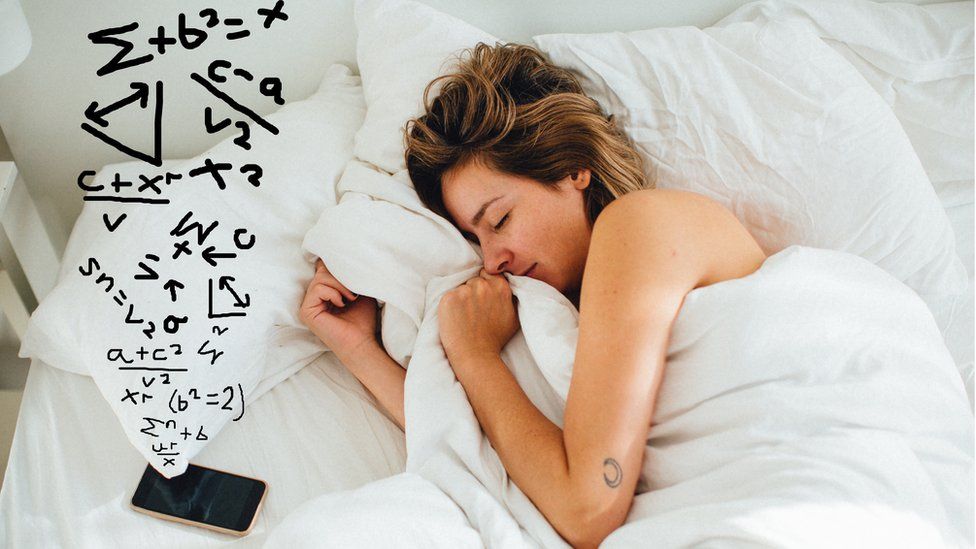Volunteering my phone to research Covid-19 while I sleep
- Published

Like most of us, Hannah Lawson-West has a regular night-time routine.
Unlike most of us though, hers involves carrying out thousands of complex scientific calculations to help fight Covid-19.
This is how it works: Hannah heads to bed at around 22:30 and turns on her electric blanket to heat up, while she washes her face and brushes her teeth.
Once in bed, she checks the news and Instagram, then plugs her phone in to charge before hitting the hay.
Then, for the next eight hours while the 31-year-old sleeps in her London flat, her phone quietly comes alive, allowing scientists to use its power to help coronavirus research.
Hannah has been doing this every night for over a year, and her phone so far has completed almost 2,500 calculations.
She's just one of nearly 100,000 people around the world regularly donating smartphone computing time to the DreamLab app.
The app is searching through digital simulations of food molecules to assess which combinations of nutrients may offer some medical benefits to treat Covid-19 or those suffering from so-called 'long Covid' symptoms.
There is currently no evidence that any food can help people with Covid, or stop them from getting Covid and considerably more research is needed to explore the findings of the project to determine if they are truly beneficial.
The study is being run by Imperial College London and the Vodafone Foundation charity and the research has been published in a peer-reviewed journal.
Power of volunteer computing
Organisers say that this volunteer smartphone computer network has been invaluable to the effort.
The cohort of phones is so powerful that it can process a collection of data in just three months, which would take a normal computer 300 years to process.
"I was first introduced to the app at the same time that my Dad was diagnosed with blood cancer," Hannah says. "The first project I 'powered' was trying to speed up cancer drug discovery.
"Then, when the Covid-19 pandemic hit, it felt right to change my project to a Covid-19-specific one.
"I like to look at the app on the weekends and it still baffles me how easy it is to do something rewarding whilst I sleep. To be honest, I'm not sure why more people aren't doing it."
Volunteers like Hannah have so far carried out more than 53 million calculations. The app is available worldwide and currently has users in 17 countries including the UK, Australia, South Africa, Germany, Ghana, Greece, Spain and Portugal.
900 miles away from Hannah's bedside table, in Lisbon, Angélica Azevedo's phone is also silently crunching the numbers while she sleeps.
"My Mum passed away with leukaemia during the pandemic," Angélica says.
"I guess I'm a bit more sensitive to medical matters because of this, and I feel that if I can do something to help find a cure for Covid, I will definitely try and do it."
The 28-year-old says she likes to look at the app first thing in the morning to start the day on a positive: "I check how many calculations my phone has done overnight and it makes me feel like I have contributed somehow," she says.
Grateful scientists
Professor Kirill Veselkov from Imperial College London's Faculty of Medicine says he is extremely grateful to all the people who have helped boost his research.
The "Corona-AI" project is only 55% complete, but even with the supercomputers at his university his team could not have got as far as the volunteers have in such a short period of time.
"100,000 smartphones is two to three times faster than the super-computers I have access to so it's been incredible to have so many people give us their compute each night."
"Every time a volunteer successfully completes a "calculation", what their phone actually does is run through a complex simulation trying out various food molecule combinations to see which ones might theoretically help a person fight Covid-19. There are nearly 100 million different combinations to try so the more phones, the better."
Professor Veselkov's paper is due to be published in the journal Human Genomics.
In the paper, researchers says they have found more than 50 specific molecules that could theoretically have anti-COVID-19 properties.
Dr Simon Clarke, Associate Professor in Cellular Microbiology at the University of Reading said: "This is an interesting paper setting out how to crunch big data sets using people's smartphones and highlights a novel way that researchers are scratching the surface of some of the fundamentals about how Covid-19 works.
"Although the identification of nutrients in food may possibly have a role in the future reduction of severe Covid-19, it's important that the current pandemic will be managed through continuing to follow safe social distancing, hygiene and the much welcomed vaccines that are being developed."
Crowd computing origins
Volunteer computing started in the late 1990s. The first big project which had more than 100,000 volunteers was 'SETI@home', a scientific experiment based at University College, Berkeley. SETI used internet-connected computers to search for extra-terrestrial life by asking people to run a free program which downloads and analyses radio telescope data.
Dr David P. Anderson co-founded the project, and has since built a software platform called BOINC for others to use for their own research.
"The majority of the world's computing power isn't in clouds or super-computer centres, it's in people's houses," he said.
"It's in their desktop computers, their phones, their cars and appliances. There are billions and billions of these devices. Volunteer computing puts these devices to work on scientific research."
Another crowd-sourced Covid-19 project is being carried out through the popular online computer game Eve Online.
A mini-game in Eve involves categorising cells
The game-makers say more than 171,000 players have completed 47 million mini-game tasks to help categorise coronavirus cells.
By marking out different cell populations, researchers say they can then analyse how the virus affects the immune system.
Related Topics
- Published9 November 2020